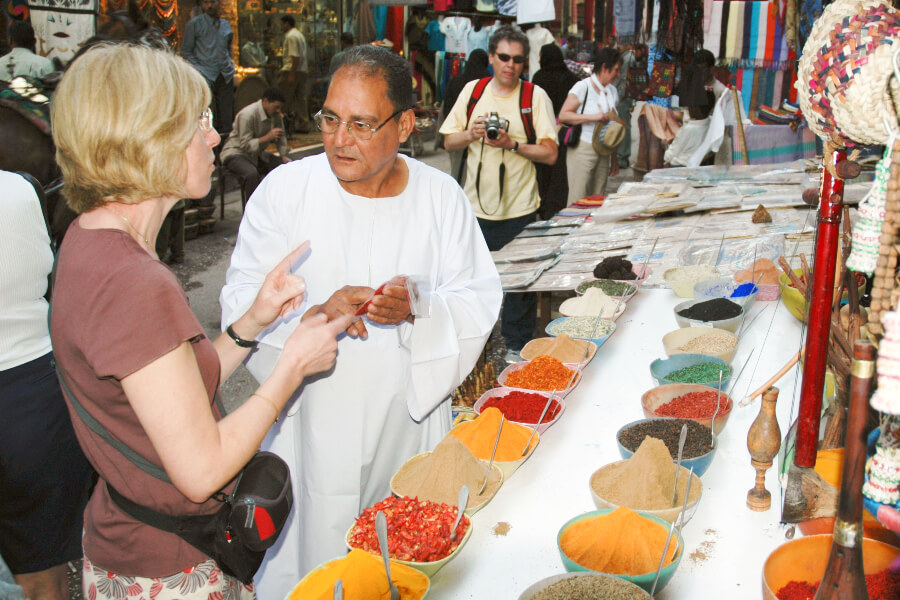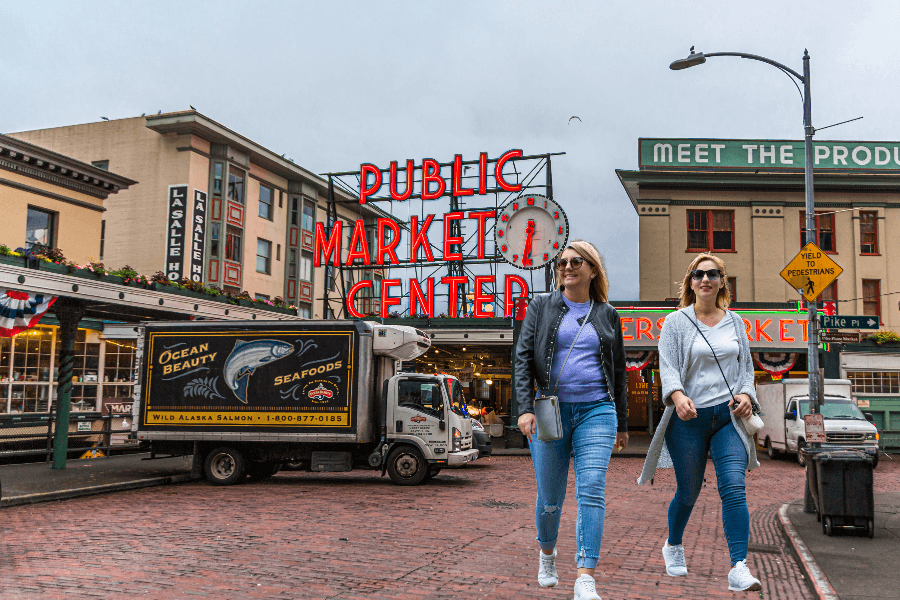Some folks have unlimited funds to buy whatever strikes their fancy on vacation. Then there’s the rest of us. That said, even the fabulously wealthy can appreciate a good deal—and nobody wants to get ripped off. But negotiating financial transactions, even on the level of a few souvenirs, is a skill and an especially tricky one in a foreign country with different cultural mores.
NextTribe takes small groups of women 45+ on fun, transformational trips around the world. Won’t you join us?
Well, fret not, intrepid bargain-hunter! We sought hints for haggling from travel pros and experienced tourists like you for their top tips. Follow this guidance and you’re sure to score!
Consider the Site
Think haggling equals bad manners? Think again. It’s considered perfectly polite and even expected in certain cultures, particularly in South and Central Asia, North Africa, Latin America, and the Middle East. Vendors in some parts of Europe, such as the Balkans, may also be happy to haggle. According to the Llama Travel blog, as long as you “bargain with respect” and seek to understand local standards, you likely won’t insult anyone while contributing to an economy that may rely heavily on the tourist trade.
Just bear in mind the location: Yes to haggling at the antique stalls of London’s Portobello Road, but no at a nearby boutique.
Just bear the location and type of business in mind, just as you would at home. Sure, you may be able to haggle successfully at London’s Portobello Road but it will be received with chagrin if you dare to dicker at Chanel on the Champs-Élysées. In general, bargaining is welcome at flea markets, bazaars/souks, resale shops, and the like, but be prepared to pony up at regular retail establishments.
Do Your Research Before You Haggle
Put a little forethought into shopping abroad—by going online or simply asking your tour guide, hotel concierge, or other natives. Learning ahead of time the sort of stuff you’ll encounter, what goods are made of and by whom (man or machine), and the price range will help you figure out what you’ll be willing to pay. These can be good resources as well for intel on how and where to negotiate so you don’t accidentally insult anyone.
Consult key sources to know when and where to haggle and how much items typically go for.
“Knowledge is power,” says DJ Lewis, who recently returned from West Africa. She was hoping to find cool fabric for pillows, so before arriving in Senegal, she read up on what she might see there and also perused Etsy to get a sense of the stateside cost. “So when I fell in love with a beautiful wax print, I knew what I wanted to pay. The seller wasn’t having it, however—so I said thanks and walked away,” she says. “I figured other stalls would have similar material. Well, the vendor ran and caught up with me, and came very near to my offer, so I bought from him.” (That “just walk away” move can be another of the hints for haggling; some people find this action can bring on the bargains.)
Cover the Terrain
Local markets in small towns can be quite vast (Ecuador’s popular Otavalo Market, for instance, is the largest of its kind in South America), so scout out as much of the place as you can before you begin bargaining. Try this hint for haggling: Take pictures, and make sure you can circle back to a vendor whose wares you really like. While strolling, compare prices if they’re listed or if a vendor offers them (keeping in mind that a seller may size you up before naming a price—so see the next tip!).
Let Your Body Talk First
Body language is universal, which can be important when negotiating in a country where natives may not speak English. Basically, you don’t want to seem too much like an eager beaver. A small smile and the occasional nod with minimal eye contact ought to indicate that you’re just browsing. You can also mime “too much!” with your facial expression (think Macaulay Culkin in Home Alone) or simply shake your head vigorously if you hear a price you don’t like.
A small smile and nod can indicate that you’re just browsing, which can be a good mode for shopping.
“I try not to touch things until I see something I may really want to purchase,” says Arlene Parnasse, who has shopped at Otavalo. “Feeling the weave of textiles or just picking stuff up tends to indicate interest and acts as an invitation for the seller to engage with you.” (If you do touch items, treat them with care—be gentle!)
Read more: “My Favorite Travel Souvenir Ever!”
Dress Down
What’s more, if you look and act like a big spender you may be treated as one. So the last of our hints for haggling is to dress and behave modestly. In fact, it’s best to keep your shopping money in small denominations and in a separate zippered pouch or pocket, away from your other cash, credit cards, and passports. You’ll seem less of an easy target to vendors who might jack up their prices, not to mention any thieves that may be lurking.
Happy hunting and haggling!























0 Comments